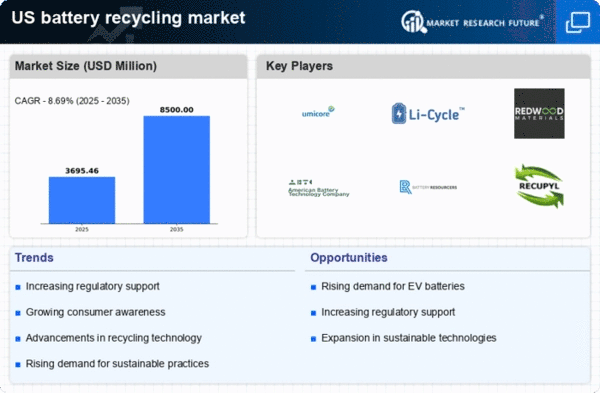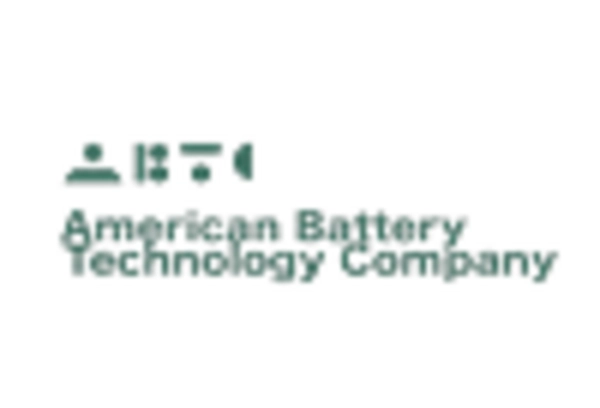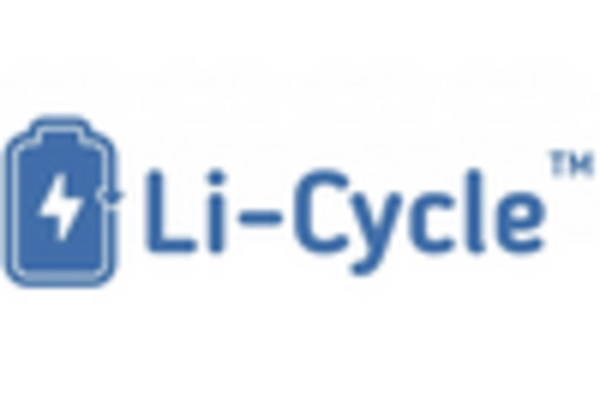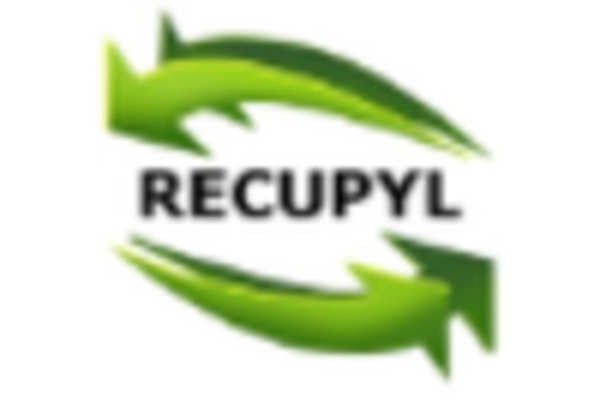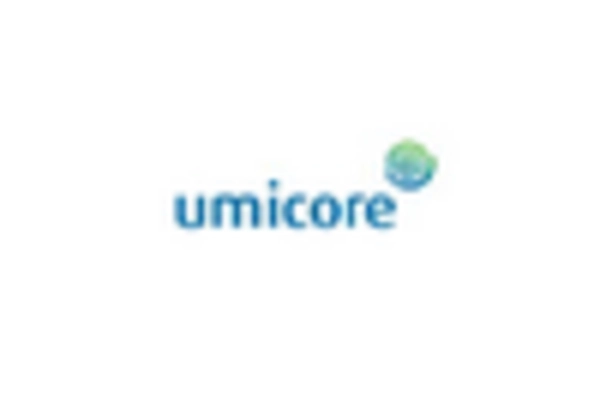Rising Raw Material Costs
The escalating costs of raw materials used in battery production, such as lithium, cobalt, and nickel, are driving interest in the battery recycling market. As these materials become scarcer and more expensive, the economic viability of recycling used batteries increases. In 2025, the price of lithium is projected to rise by over 30%, prompting manufacturers to seek alternative sources for these critical components. Recycling offers a sustainable solution, allowing for the recovery of these valuable materials from end-of-life batteries. This trend not only supports the battery recycling market but also encourages innovation in recycling technologies. By investing in advanced recycling processes, companies can enhance their profitability while contributing to a circular economy. Thus, the rising costs of raw materials serve as a significant catalyst for growth within the battery recycling market.
Legislative Mandates for Recycling
Legislative measures aimed at promoting recycling are increasingly influencing the battery recycling market. In 2025, several states have enacted laws requiring manufacturers to implement take-back programs for used batteries. These regulations are designed to ensure that batteries are disposed of responsibly and recycled effectively. As a result, manufacturers are compelled to invest in recycling infrastructure, which in turn stimulates growth in the battery recycling market. The introduction of such mandates not only enhances environmental protection but also fosters a culture of sustainability among consumers. Furthermore, these regulations may lead to increased collaboration between manufacturers and recycling facilities, creating a more efficient recycling ecosystem. Consequently, the legislative landscape is a crucial driver for the battery recycling market, shaping its future trajectory.
Corporate Sustainability Initiatives
The increasing emphasis on corporate sustainability is influencing the battery recycling market. Many companies are adopting sustainability goals that include responsible sourcing and recycling of battery materials. In 2025, it is expected that over 60% of major corporations will have established formal recycling programs for their battery waste. This shift reflects a broader commitment to environmental stewardship and social responsibility. As businesses recognize the importance of sustainable practices, they are more likely to invest in the battery recycling market, thereby driving growth. Additionally, partnerships between corporations and recycling facilities can enhance the efficiency of recycling operations, creating a win-win scenario for both parties. This trend indicates that corporate sustainability initiatives are not only beneficial for the environment but also serve as a catalyst for the battery recycling market.
Technological Innovations in Recycling
Technological advancements in recycling processes are transforming the battery recycling market. Innovations such as hydrometallurgical and pyrometallurgical methods are enhancing the efficiency of material recovery from used batteries. In 2025, it is anticipated that these technologies will improve recovery rates by up to 90%, making recycling more economically attractive. As companies adopt these cutting-edge techniques, the battery recycling market is likely to experience significant growth. Moreover, the development of new technologies may lead to the creation of secondary markets for recovered materials, further driving demand. This trend underscores the importance of research and development in the recycling sector, as it not only improves operational efficiencies but also contributes to sustainability goals. Thus, technological innovations are a key driver of the battery recycling market, shaping its evolution.
Increasing Demand for Electric Vehicles
The surge in electric vehicle (EV) adoption in the US is a pivotal driver for the battery recycling market. As more consumers transition to EVs, the demand for lithium-ion batteries escalates, leading to a corresponding increase in battery waste. In 2025, it is estimated that the number of EVs on the road will exceed 20 million, creating a substantial need for effective recycling solutions. This trend not only highlights the importance of sustainable practices but also emphasizes the economic potential within the battery recycling market. The recovery of valuable materials from used batteries can significantly reduce the reliance on raw material extraction, which is often environmentally detrimental. Consequently, the battery recycling market is poised to benefit from this growing demand, as manufacturers and consumers alike seek to minimize their ecological footprint.


